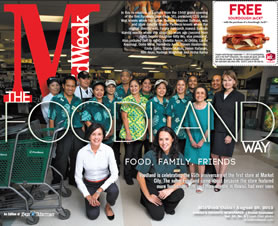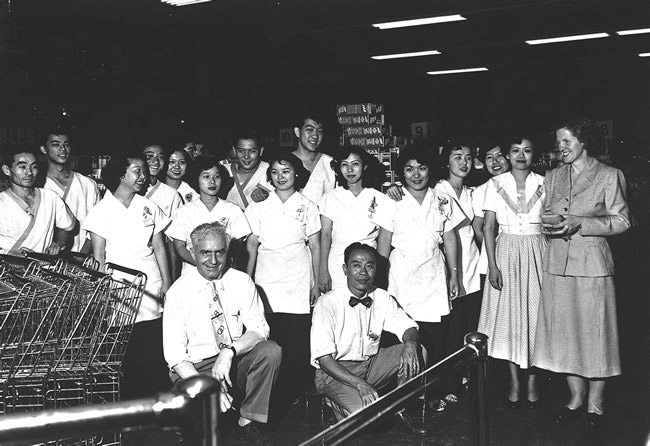The Foodland Way: Food, Family, Friends
FAMILY
Family values and inclusiveness drive Foodland’s corporate culture.
Wall recalls, “From its earliest days, Foodland relied on the support of many people. U.S. Sen. Hiram Fong and his family, who had purchased the land at the corner of Kapiolani and Harding, took a gamble by leasing space for our first store (opened May 6, 1948). Two big grocery wholesalers provided merchandise to stock the store based on Sully’s promise that he would pay them back a week after the store opened. The newspapers gave Sully advertising on credit.”
mw-082813-foodland-1
They were all smiles at the grand opening of Foodland at Market City in 1948. That's founder Maurice 'Sully' Sullivan and store director Tommy Wong kneeling. At far right is Julia O'Sullivan, Sully's sister (he'd dropped the O from his name). Beside her is Joanna Lau, Sully's future wife. Front row, third female from the left, is cashier Sachiko Shimabuku Saito, mother of Emily Saito, current employee who stands in the same place in our re-created cover photo. Photos courtesy Foodland
Joanna Sullivan remembers, “We worked really hard up until the last minute. The crowds were much bigger than we expected. We had to close the doors periodically so we could restock the shelves.”
For many, being a courtesy clerk or bagger is entry to the job market. Foodland counts among its past workers prominent retired banker and civic leader Walter Dods and MidWeek publisher Ron Nagasawa.
For others, like Faith Koyasu-Ines, intranet manager at Foodland’s corporate office, a full-time career developed from an entry position. She took a job while a college student, didn’t plan to stay, but went on to a career path that culminates this year in 29-and-a-half years of service.
Herman Deuz Jr., receiver at Foodland Ewa Beach, marks 52 years in October and has the longest tenure with the company. He recalls Sully’s remarkable retention of names of hundreds of employees.
There is an extended “family” that gets attention as well. It’s the community in which Foodland operates.
Programs such as “Give Aloha” involve charitable giving to some 670 nonprofit organizations. During September, customers are invited to make donations at checkout to their favorite organization registered in the Give Aloha program. Foodland and Western Union Foundation match donations up to $350,000. To date, more than $17 million has been donated to local organizations, including schools.
“Hanahau’oli School has benefited tremendously from annual participation in this program,” says Selena Ching, director of institutional advancement at the Makiki campus. “Funding from this program goes toward supporting curriculum enhancements, classroom supplies, teacher training and facilities maintenance.”
Ad executive Martin D. Schiller, a close friend of Sully’s, proclaims, “If there is one word to associate with Sully, it is ‘give.’ He had a strong sense of responsibility for our community.”
Former Foodland corporate communications director Jewelle Yamada, now with Sumitomo Corporation of America in New York, says, “Sully was engaged in corporate social responsibility long before it became a fashionable business mantra, and he did it from his heart.”
FRIENDS
Foodland is a friend when it engages its customers in a positive shopping experience.
The introduction of the Maikai loyalty card, pioneered by Foodland in this market, rewards shoppers for purchases. Customers build up points to get instant savings and rewards for future purchases. It is fun to get price breaks, and it sure beats licking trading stamps.
For customer Marylou Foley, it’s the way Foodland reminds her of what makes living in Hawaii so special.
“It’s their bags,” she points out, referring to the colorful reusable bags available at checkout counters. Each in the series is designed with representations of local culture.
The designs first featured local slang (“hemajang,” “bambucha”) and grew to other whimsical versions such as Spam musubi, poke bowl, shaka sign and family potluck.
She especially likes the bright turquoise Spam musubi bag with recipes including the low-carb musubi (Spam with nori wrap, no rice) and towering six-layer Spam musubi. The family potluck design shows a sign-up list for who’s-bringing-what including Grandma (chocolate haupia pie), Aunty Pua (pork lau lau) and Maile (crab won ton).
“Who but a local company could pull it off so genuinely?” Foley suggests.
Wall says it’s simple. “Our team and family are proud that we have remained locally owned in the face of economic pressures and big competitors in the market. Our 65th anniversary is an occasion to celebrate, honor and recognize their efforts.”
We know what to bring to the party. Food, Family & Friends.







